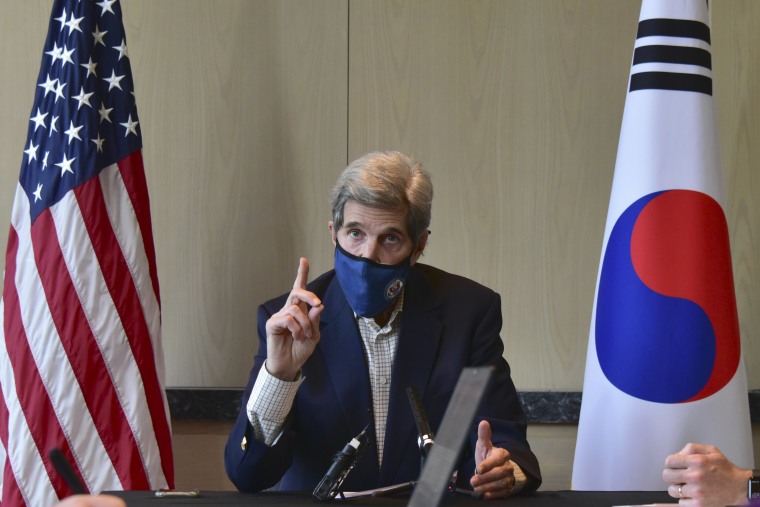They have feuded recently over Hong Kong, the treatment of the Uighur community and future of Taiwan, but the U.S. and China can agree on one thing — the fight against climate change.
Ahead of President Joe Biden's summit of world leaders to address the issue this week, the world's two biggest greenhouse gas emitters "committed to cooperating with each other and with other countries" to tackle the issue, a joint statement from the State Department and China’s Ministry of Ecology and Environment said late Saturday.
The agreement between Washington and Beijing was reached by John Kerry, the U.S. special envoy for climate, and his Chinese counterpart Xie Zhenhua during two days of talks in Shanghai last week, the statement said.
The United States and China are "to tackle the climate crisis, which must be addressed with the seriousness and urgency that it demands,” it added.
Together, they agreed to discuss specific emission reduction actions to decarbonize industry and power, including energy storage, carbon capture and green hydrogen, as well as increasing use of renewable energy, reducing emissions from coal, oil, and gas, and addressing emissions from international aviation, the statement added.
China is the world’s biggest carbon emitter, followed by the United States, and the statement said discussions had also focused on the need to maximise financing for developing countries to switch to low-carbon and renewable energy.
Biden made climate one of his key commitments in last year’s election campaign, pledging that the U.S. will achieve net-zero emissions no later than 2050.
He rejoined the 2015 Paris climate accord, a global pact to curb emissions, on the first day of his presidency. His predecessor Donald Trump pulled out of the agreement in 2017.
“Unfortunately, the U.S. became a renegade in the last four years under the non-leadership of President Trump," Kerry told British broadcaster Sky News in an interview conducted before the talks, but aired Sunday. "But we are now back and present with a very aggressive series of initiates in order to try to make up for lost time." (Sky News is owned by Comcast, the parent company of NBC News.)
Kerry arrived in Shanghai on Wednesday night under tight Covid-19 protocols. It was the first high-level visit to China by a Biden administration official. He subsequently traveled to Seoul, South Korea.
Download the NBC News app for breaking news and politics
The cooperation on climate between Beijing and Washington comes amid tensions, including China’s human rights record particularly over its treatment of the Uighur community, the crackdown on Hong Kong's protest movement, trade disputes and territorial claims in the South China Sea. The issue of Taiwan's future has also seen tensions flare between the two superpowers.
Kerry told reporters in Seoul on Sunday that the language in the joint statement is “strong” and that the two countries agreed on “critical elements on where we have to go," the Associated Press reported Sunday.
But the former secretary of state added: “I learned in diplomacy that you don’t put your back on the words, you put on actions. We all need to see what happens.”
Biden has invited 40 world leaders, including Chinese President Xi Jinping, to his climate summit this week, as the world is gearing up for global climate talks in Glasgow, U.K., in November.
Nations, including the U.S., are expected to announce more ambitious national targets for cutting carbon emissions ahead of or at the summit.
Kerry told Sky News that the U.S. will be setting forth its plan to try to do its part, and hopes to raise the ambitions of other nations.
Asked if the U.S. can have a productive conservation with China on climate amid tensions with Beijing, Kerry was positive, saying: “Every nation has a stake in the outcome of the climate issue.”
Last year, China announced it aims to have carbon dioxide emissions peak before 2030 and achieve carbon neutrality before 2060, but critics say it needs to do more.
“We recognise China is essential to resolving this crisis," Kerry said.

